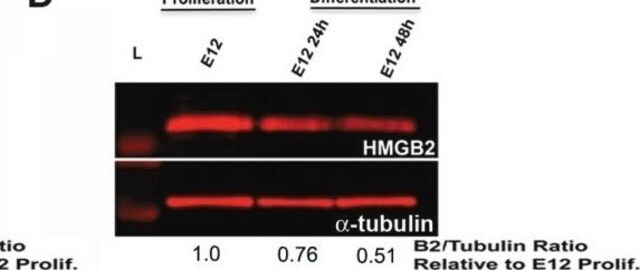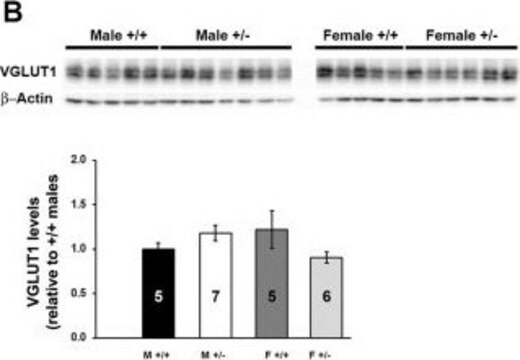AB9354
Anti-Beta III Tubulin Antibody
Chemicon®, from chicken
Synonym(s):
Anti-CDCBM, Anti-CDCBM1, Anti-CFEOM3, Anti-CFEOM3A, Anti-FEOM3, Anti-TUBB4, Anti-beta-4
About This Item
Recommended Products
biological source
chicken
Quality Level
antibody form
affinity purified immunoglobulin
antibody product type
primary antibodies
clone
polyclonal
purified by
affinity chromatography
species reactivity
rat, human, mouse
manufacturer/tradename
Chemicon®
technique(s)
immunocytochemistry: suitable
immunohistochemistry: suitable
western blot: suitable
isotype
IgY
NCBI accession no.
UniProt accession no.
shipped in
wet ice
target post-translational modification
unmodified
Gene Information
human ... TUBB3(10381)
mouse ... Tubb3(22152)
rat ... Tubb3(246118)
General description
Specificity
Immunogen
Application
1:1000 - 1:2000 dilution from a previous lot was used in immunocytochemistry using 2% paraformaldehyde fixed cells.
Immunohistochemistry:
1:1000 - 1:2000 dilution from a previous lot was used in immunohistochemistry using 2% paraformaldehyde fixed tissues.
Optimal working dilutions must be determined by the end user
Neuroscience
Neuronal & Glial Markers
Neurofilament & Neuron Metabolism
Quality
Western Blot:
1:1000 dilution of this lot detected TUBULIN BETA III on 10 μg of mouse brain lysates.
Target description
Linkage
Physical form
Four different antibodies were combined to make this product
Storage and Stability
It is recommended that the antibody be stored in the dark. During shipment, small volumes of product will occasionally become entrapped in the seal of the product vial. For products with volumes of 200 µL or less, we recommend gently tapping the vial on a hard surface or briefly centrifuging the vial in a tabletop centrifuge to dislodge any liquid in the container’s cap.
Analysis Note
Brain tissue, Neuronal culture
Other Notes
Legal Information
Disclaimer
Not finding the right product?
Try our Product Selector Tool.
recommended
Storage Class Code
10 - Combustible liquids
WGK
WGK 2
Certificates of Analysis (COA)
Search for Certificates of Analysis (COA) by entering the products Lot/Batch Number. Lot and Batch Numbers can be found on a product’s label following the words ‘Lot’ or ‘Batch’.
Already Own This Product?
Find documentation for the products that you have recently purchased in the Document Library.
Customers Also Viewed
Our team of scientists has experience in all areas of research including Life Science, Material Science, Chemical Synthesis, Chromatography, Analytical and many others.
Contact Technical Service

















